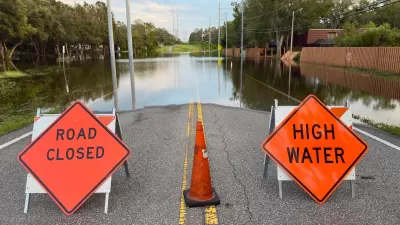As flooding, fires, and other disasters become more destructive, an effective response requires more resources than local governments can offer.

In an article for Governing, Donald F. Kettl argues that the federal government shouldn’t abandon disaster mitigation and relief to local governments and private insurers, as some have suggested.
“Virtually every part of the country is seeing more and larger emergency events, on a truly historic scale,” Kettl writes, with two major implications: first, local governments and even state governments don’t have the capacity and resources to respond to disasters as quickly as FEMA.
“Second, more mandates have followed federal aid. The feds are now requiring everyone who has had property damaged in a flood disaster within a high-risk flood area to buy insurance, either from a private company or from the federal National Flood Insurance Program.” FEMA also started a voluntary “severe repetitive loss” program that allows state and local governments to buy out properties that suffer repeated damage.
For Kettl, the federal government’s growing role in disaster management is inevitable.
FULL STORY: Why Washington Can't Get Out of the Disaster Relief Business

Study: Maui’s Plan to Convert Vacation Rentals to Long-Term Housing Could Cause Nearly $1 Billion Economic Loss
The plan would reduce visitor accommodation by 25,% resulting in 1,900 jobs lost.

North Texas Transit Leaders Tout Benefits of TOD for Growing Region
At a summit focused on transit-oriented development, policymakers discussed how North Texas’ expanded light rail system can serve as a tool for economic growth.

Using Old Oil and Gas Wells for Green Energy Storage
Penn State researchers have found that repurposing abandoned oil and gas wells for geothermal-assisted compressed-air energy storage can boost efficiency, reduce environmental risks, and support clean energy and job transitions.

Private Donations Propel Early Restoration of Palisades Playground
Los Angeles has secured over $1.3 million in private funding to restore the Pacific Palisades playground months ahead of schedule, creating a modern, accessible space that supports community healing after recent wildfires.

From Blight to Benefit: Early Results From California’s Equitable Cleanup Program
The Equitable Community Revitalization Grant (ECRG) program is reshaping brownfield redevelopment by prioritizing projects in low-income and environmental justice communities, emphasizing equity, transparency, and community benefits.

Planting Relief: Tackling Las Vegas Heat One Tree at a Time
Nevada Plants, a Las Vegas-based nonprofit, is combating the city’s extreme urban heat by giving away trees to residents in underserved neighborhoods, promoting shade, sustainability, and community health.
Urban Design for Planners 1: Software Tools
This six-course series explores essential urban design concepts using open source software and equips planners with the tools they need to participate fully in the urban design process.
Planning for Universal Design
Learn the tools for implementing Universal Design in planning regulations.
Ascent Environmental
Borough of Carlisle
Institute for Housing and Urban Development Studies (IHS)
City of Grandview
Harvard GSD Executive Education
Toledo-Lucas County Plan Commissions
Salt Lake City
NYU Wagner Graduate School of Public Service





























